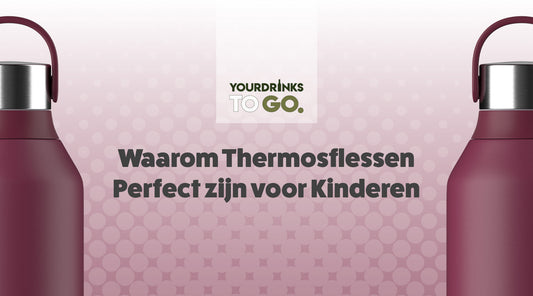
5 Habits That Will Make Your Life More Sustainable
Sustainable living isn’t just a buzzword; it’s become a necessity in a world increasingly burdened by climate change and resource depletion. By making small changes to your daily habits, you can have a positive impact on the environment, your health, and your wallet. In this blog post, we share five simple habits that will make your life more sustainable, based on key insights and supported by some striking facts.
Use Reusable Thermos Flasks
One of the most effective ways to reduce your carbon footprint is to use reusable thermoses. The average Dutch person throws away around 50 plastic bottles per year – and that is only a fraction of the global problem. By switching to a reusable thermos, you not only reduce the amount of plastic waste, but you also contribute to lower CO₂ emissions.
Additionally, reusable thermoses are designed to keep your drinks hot or cold for longer, so you can not only help the planet but also enjoy your favorite beverage at the ideal temperature.
Benefits of Reusable Thermos Flasks:
- Reduction of annual plastic waste, which accounts for an average of 60% of total plastic production worldwide.
- Saving on the costs of disposable bottles.
- Durable and stylish in use.
At YourdrinksToGo you will find a wide range of sustainable thermos flasks in different colours and styles, which are specially made to last.
Buy Less and More Consciously
The current consumer culture encourages us to constantly buy new things, which leads to a huge environmental impact. For example, the average Dutch person buys around 46 items of clothing per year, many of which are quickly thrown away. You can break this cycle by buying less and only choosing sustainable, high-quality products.
Ask yourself some critical questions before making a purchase:
- Do I really need this?
- Where does it come from?
Reducing unnecessary purchases not only offers financial benefits, but also helps to refresh your living space without adding to the waste mountain. In addition, second-hand and refurbished products are often up to 50% cheaper and use fewer raw materials.

Eat More Sustainably
Your diet has a significant impact on the environment. Meat production is responsible for nearly 60% of all greenhouse gas emissions from agriculture. By reducing your meat consumption and choosing more plant-based options, you can significantly reduce your carbon footprint. Even going meat-free one day a week can make a big difference.
Tips for more sustainable eating:
- Choose seasonal and locally produced food; a simple choice like a locally grown apple reduces transportation emissions.
- Avoid products containing palm oil; approximately 10 million hectares of tropical rainforest are cut down each year for palm oil production.
- Explore vegetarian and vegan recipes that require fewer ingredients.
Sustainable food is not only good for the earth, but also for your health.
Separate your waste and recycle
Separating and recycling waste may seem like a simple habit, but its impact is enormous. For example, recycling just one ton of paper saves up to 17 trees and significantly reduces CO₂ emissions. By collecting materials such as paper, plastic and glass separately, you contribute to the production of new products without the need for new raw materials. This reduces CO₂ emissions and helps prevent pollution.
Take the time to learn what is and isn't recyclable. For example, old clothes and textiles can often be given a new life in the textile bin, while broken electronic devices can be recycled for their valuable components.

Choose Sustainable Transport
The way we travel has a significant impact on the environment. Transportation, especially cars and planes, contributes significantly to CO₂ emissions. Did you know that 14% of global CO₂ emissions come from transportation? Therefore, make conscious choices in your mode of transportation. Consider cycling more often or walking for short distances.
Sustainable Transportation Options:
- Cycle or walk for short journeys; for every 10 km you cycle instead of driving, you save 2.5 kg of CO₂.
- Public transport or carpooling for longer distances.
- Consider an electric or car-sharing car for everyday use, which can lead to a 40% reduction in emissions.
By choosing sustainable transportation options, you reduce your reliance on fossil fuels and help make the Earth a little cleaner.
Conclusion: Sustainable Living Starts with Small Habits
Sustainable living doesn't have to be complicated. By making small changes, such as using a reusable thermos, consuming more consciously, eating sustainably, separating waste and choosing environmentally friendly transport, you are already contributing to a better world.
At YourdrinksToGo we support a more sustainable lifestyle with products that contribute to a better world, such as our reusable thermos flasks . Think about the future of our planet and start implementing these habits today.
Frequently Asked Questions
1. What exactly is sustainable living?
Sustainable living means making conscious choices that are good for your health and well-being, but also respecting the climate and environment. This includes less waste, reusing things and choosing local, sustainable products.
2. Why are reusable thermos bottles sustainable?
Reusable thermoses reduce the need for single-use plastic bottles, thus reducing plastic waste. They are also long-lasting and keep drinks warm, making them ideal for on-the-go.
3. How much impact does food waste have on the environment?
Food waste contributes to CO2 emissions, because waste is burned or rots. By using leftovers and planning smartly, you reduce the demand for food production, which benefits the environment.
4. Is it really better to buy refurbished products?
Yes! Refurbished products, such as electronics, are repaired and refurbished, which contributes to less electronic waste and saves raw materials for new products.
5. What impact does plant-based eating have on the environment?
Eating plant-based foods reduces your ecological footprint, because the production of plant-based foods often requires less water, land and energy and emits less CO2 than meat production
Are there any things that are unclear or would you simply like to read more about us?
Then feel free to take a look at one of our other blog posts!
Discover The New Chilly's Series 2 Thermos Flasks




